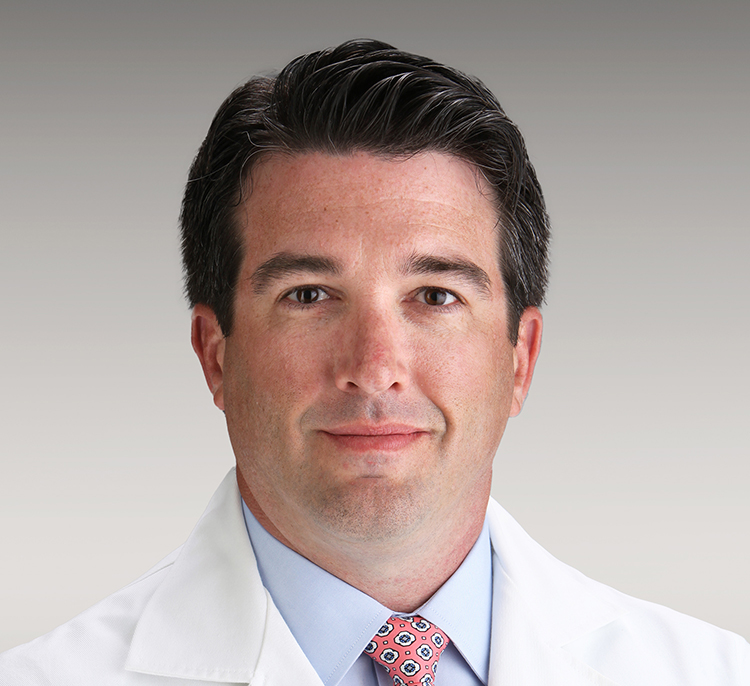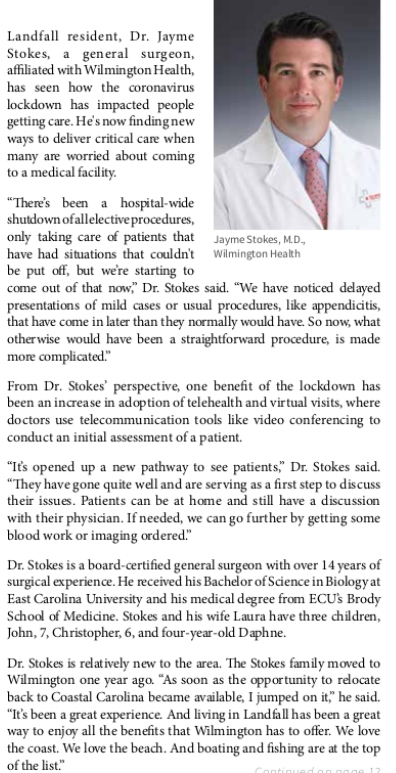
Jayme Stokes, MD, FACS
Bariatric Surgery
General Surgery
Robotic Surgery
Surgery
Explore Patient Comments about Care Received by This Provider →
Biography
Dr. Jayme Stokes is a board-certified experienced general surgeon with over 10 years of surgical experience. He received his Bachelor of Science in Biology at East Carolina University in Greenville, North Carolina. He earned his medical degree from East Carolina University – Brody School of Medicine in Greenville, North Carolina.
He completed his general surgery residency and minimally invasive surgery fellowship at the University of Virginia Health System in Charlottesville, Virginia. He received Fellowship into the American College of Surgeons in 2020.
Licensures/Certifications:
- American Board of Surgery
- Advanced Trauma Life Support
Meet Dr. Jayme Stokes
Conditions and Procedures
- Hernia Repair
Inguinal
Umbilical
Ventral
Incisional
Recurrent
Peri-Stomal
Complex Abdominal Wall Reconstruction - Minimally Invasive/ Laparoscopic Surgery
Gallbladder Surgery
Small Bowel Surgery
Colon/Appendix Surgery
Spleen Surgery - Bariatric Surgery
Gastric Bypass
Robotic Sleeve Gastrectomy
Adjustable Gastric Band
Revisional Surgery - Skin and Soft Tissue Surgery
(Masses, Lesions & Malignancies) - Foregut Surgery
Antireflux Surgery
Hiatal Hernia/ Paraesophageal Hernia Repair
Stomach Surgery - Endoscopy Procedures
Professional Associations
American College of Surgeons
American Society of Metabolic and Bariatric Surgery
Society of American Gastrointestinal and Endoscopic Surgeons
American Hernia Society
Articles & Interviews
HEALTH WATCH: 5 things to know about gallbladder pain
By Stephanie Bowens StarNews Correspondent
Removing the organ is a common procedure for those experiencing problems
The gallbladder is a small pear-shaped organ that sits below the liver and stores bile produced in the liver. The body uses bile to digest fats in the small intestine. When individuals have problems with their gallbladder, many have the organ surgically removed through a procedure called cholecystectomy. The American College of Surgeons said gallbladder removal is used to relieve pain, treat infection and stop gallstones from coming back.
Dr. Jayme Stokes, MD, a board a board-certified general surgeon with more than 14 years of surgical experience, said gallbladder surgery is a common operation and as a general surgeon he typically removes 2-5 gallbladders a week, or between 100-200 gallbladders in a year.
1) People can live normal lives without their gallbladder
Stokes said the gallbladder functions like a reservoir or storage tank for bile created by the liver.
“The gallbladder will collect some of that bile and hang on to it and store it, so that when you have a meal, especially one that’s high in fat or greasy foods, it can squeeze and dump some extra bile into your intestines to aid in digestion,” he said.
While the gallbladder helps with digestion, Stokes said its removal typically doesn’t negatively impact one’s ability to live normally.
“The vast majority of patients wouldn’t experience any changes in their health other than hopefully feeling better and not have the pain and discomfort they were having before the surgery,” he said.
2) Problems with gallstones are common reasons for gallbladder surgery
“Most of the times in the outpatient or elective setting we’re removing gallbladders due to problems with gallstones,” Stokes said. “There’s several chemicals that make up the bile, and when those chemicals get out of balance they can precipitate out and form little crystals, much like pouring too much sugar into your tea, and those crystals can collect together and form little stones. Simply having stones in your gallbladders is not worrisome, but those stones can sometimes cause pain and problems.”
Gallstones can sometimes block the exit of the gallbladder.
“When the organ squeezes after a meal, squeezing against that blockage can be very uncomfortable and hurt,” Stokes said. “We have some people who say after I eat I have pain in my right upper quadrant (abdomen), or around in the right shoulder blade. They may feel nauseated, have some indigestion or heartburn, and that would be a reason to take their gallbladder out.
“Sometimes we’ll see patients in the emergency department where one of those stones have become lodged in the exit of a gall bladder. This can lead to cholecystitis, an inflammation of the gallbladder.
“Those patients typically need their gallbladder removed typically in an urgent fashion, usually when they are being seen in an emergency department.”
3) Cholangitis and poor function are some other reasons for gallbladder removal
Sometimes gallstones can exit the gallbladder, clogging up the pipes draining bile from the liver into the intestines and leading to an infection called cholangitis.
“When that happens, those patients can get pretty sick really quickly,” Stokes said. “It can also cause pancreatitis. Those patients would need a procedure to remove the stone(s) from that main bile duct or main pipe, and then they would need to have the gallbladder removed to prevent stones from exiting the gallbladder and causing that same infection again.”
Stokes said another common reason for gallbladder removal is a gallbladder that simply doesn’t function well.
4) Two options to remove the gallbladder are open and laparoscopic cholecystectomy
“The most common way to remove the gallbladder today is called a laparoscopic cholecystectomy, where we bring the patient into the operating room and through usually four tiny incisions no larger than length of fingernail we can insert a camera and remove the gallbladder…,” Stokes said. “The nice part about that operation is the pain is very well tolerated, and it’s a much easier operation to recover from.”
The other option is open cholecystectomy. According to the ACS, open cholecystectomy involves a large incision, about 6-inches long, in the upper right side of the abdomen and requires cutting through the fat and muscle to get to the gallbladder.
5) Diet changes are sometimes an alternative to gallbladder surgery
For some, modifying their diet may bring relief from symptoms without surgery.
“For patients who are coming to the office with pain related to gallstones, one option is to try to modify their diet, such as avoiding foods that are high in fat or high in grease,” Stokes said. “Sometimes spicy foods will (also) cause the pain. Sometimes patients can be successful avoiding those foods, and that can sometimes alleviate the pain. However, it doesn’t eliminate the gallstones. Once the gallstone is formed it’s there forever, but by changing your diet a little bit, we can minimize the amount of work the gallbladder has to do and that can hopefully minimize the amount of discomfort a patient feels.”
Contact the newsroom at 910-343-2384 or Breakingnews@StarNewsOnline.com.
Thanking Our Healthcare workers
Resource: Intracoastal Living Magazine June 2020
HEALTH BRIEFS: New doctor joins NHRMC Physician Group
By Cheryl Whitaker
Posted Sep 17, 2020 at 6:00 AM
Wilmington Health adds bariatric surgery to list of services
WILMINGTON — Wilmington Health has added a specialization in bariatric surgery with the addition of Jayme Stokes, a general surgeon to the staff. Now, patients throughout the greater Southeastern North Carolina area can receive surgical assistance in their personal battles with weight loss and pathway to better overall health.
Dr. Stokes, a Greenville native, received his undergraduate and medical degree from East Carolina University and completed his general surgery residency and minimally invasive surgery fellowship at the University of Virginia Health System. During his time at the University of Virginia, he expanded his training to include the skills necessary to provide bariatric surgical services.
Board certified in general surgery, Dr. Stokes offers gastric bypass surgery, sleeve-gastrectomy, adjustable gastric band management and revisional surgery.
Resource: Gaston Gazette
Bariatric Surgery
Bariatric Surgery
General Surgery
General Surgery
Clinical Interests
Surgical treatment of:
- Obesity and obesity-related diseases including gastric bypass, sleeve gastrectomy, management of adjustable gastric bands, and revisional bariatric surgery
- Heartburn and reflux including hiatal hernia repairs, paraesophageal hernia repairs, Nissen and Toupet fundoplications
- Abdominal wall hernias including open and laparoscopic repair of inguinal, umbilical, incisional, and recurrent hernias
- Gallbladder disease including laparoscopic cholecystectomy
Patient Satisfaction
Our patient satisfaction surveys help us identify areas of improvement to work toward providing you with the best healthcare in the area. Patient satisfaction, along with increasing the quality of care delivered and reducing healthcare costs, are the three organizational objectives we focus on each and every day.
How does Jayme Stokes compare?
-
How would you rate how well this provider communicates? (easy to understand, listens carefully to you, shows respect for what you had to say, sensitivity, friendliness)
Using a number from 1 to 5, where 5 is the best provider possible and 1 is the worst provider possible, what number would you use to rate this provider?
Locations
-
Wilmington – 1202 Medical Center Drive
Wilmington
Bariatric Surgery
910-763-6289 Text or Call
910-251-1420 Fax



